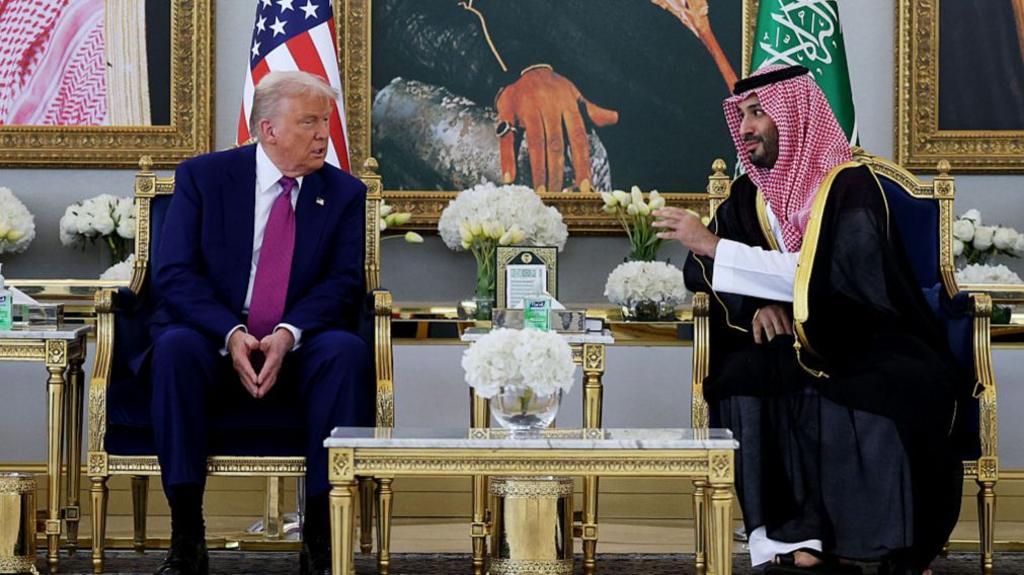US President Donald Trump landed in Saudi Arabia Tuesday, beginning what he described as a “historic” Middle East tour that balances urgent Gaza diplomacy with major business negotiations. The trip comes as a US-Israeli hostage was released and amid speculation about possible Ukraine-Russia peace talks that could alter his itinerary.
Royal Welcome in Riyadh Marks Tour’s Beginning
US President Donald Trump received a warm welcome in Saudi Arabia Tuesday as Crown Prince Mohammed bin Salman personally greeted him upon Air Force One’s arrival at King Khalid International Airport in Riyadh. The presidential aircraft received an honorary escort from Royal Saudi Air Force F-15s as it approached the Saudi capital, underscoring the significance of Trump’s visit.
Following the arrival ceremony, the two leaders retreated to a grand hall at the airport where Trump and his delegation were served traditional Arabic coffee by attendants wearing ceremonial gun-belts. The Crown Prince and Trump later participated in a lunch gathering at the Royal Court with guests and aides, with a formal dinner hosted by Prince Mohammed scheduled for later in the day.
Trump’s Saudi agenda also includes participation in a US-Saudi investment conference on Tuesday, highlighting the economic dimension of his visit before continuing to Qatar and the United Arab Emirates.
Gaza Crisis and Hostage Release Influence Diplomatic Mission
As Trump’s plane departed for Saudi Arabia, a significant diplomatic breakthrough occurred with US-Israeli hostage Edan Alexander being handed over to the Red Cross. “It’s big news,” Trump remarked at the White House shortly before leaving. “He’s coming home to his parents, which is really great news. They thought he was dead.”
Despite initially boasting that he could swiftly end the Gaza conflict, Trump has recently appeared to moderate his approach. His relationship with Israeli Prime Minister Benjamin Netanyahu has grown increasingly strained over Gaza strategy, Yemen’s Houthi strikes, and Iran’s nuclear program.
Following Alexander’s release, Hamas urged Trump to “continue efforts” to end the war, while Netanyahu announced he would send mediators to Qatar on Tuesday for further negotiations. Qatar has been instrumental as an intermediary in efforts to resolve the conflict.
Trump expressed hope for additional developments regarding Gaza during his Gulf tour, noting that his trip involves “three primary countries” in the region. “I hope that we’re going to have other hostages released too,” he said when questioned about prospects for a ceasefire in the Palestinian territory.
Potential Ukraine Peace Talks Could Alter Presidential Schedule
In a surprising development, Trump indicated his schedule remains flexible, potentially including an unplanned trip to Istanbul on Thursday if Russia-Ukraine peace talks materialize there. “I don’t know where I’m going to be at that particular point, I’ll be someplace in the Middle East. But I would, if I thought it would be helpful,” Trump told reporters Monday.
The president suggested both Ukrainian President Volodymyr Zelensky and Russian President Vladimir Putin might attend such talks, raising possibilities for a historic diplomatic summit. This flexibility demonstrates the fluid nature of international diplomacy during his tour.
Trump also addressed Iran’s nuclear program, noting “very good things happening” in talks between Washington and Tehran, while firmly maintaining that Iran “can’t have a nuclear weapon.”
Middle East Rather Than Western Allies Takes Priority
Trump’s decision to begin his first major overseas tour of his second term in Saudi Arabia mirrors his debut international trip in 2017, when he memorably posed over a glowing orb with leaders from Egypt and Saudi Arabia. However, unlike that previous journey, the current itinerary does not include Israel.
The president’s choice to prioritize Gulf states over traditional Western allies highlights both their growing geopolitical significance and Trump’s personal business connections in the region. This strategic focus underscores the changing dynamics of US foreign policy priorities under his administration.
As the trip unfolds across multiple Gulf nations, the complex intersection of hostage negotiations, ceasefire discussions, potential peace talks, and business deals illustrates the multifaceted nature of Trump’s “historic” Middle East diplomatic mission.


